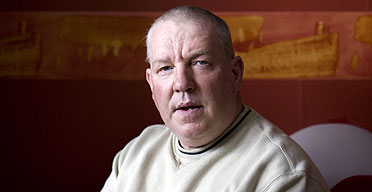
When I was a boy, my dad used to help me do my tables. For some reason, perhaps because it was the trickiest, he used to force me to repeat the 12 times table over and over again. I think it's what led to my obsession with the number 12, and the fact that I now count constantly in my head anything I see - eggs, potatoes, tins in the cupboard. I count to 12 and I'm calm.
I have obsessive compulsive disorder, and counting, or numerating as I call it, is just one of my rituals. I also have to have every single one of my possessions in immaculate and intricate order at all times. As a result I haven't taken anything out of my wardrobe for a year; the clothes in my drawers have been there for three. Every morning, I run my hands in slow motion down the side of my trousers and shirts. I long to throw them on and go out. Instead, my anxiety heightens to such a pitch that I fear moving anything will lead to the death or suffering of someone I love. I get an overwhelming compulsion to do a ritual, and count rapidly to 12 on my fingers, then chant my key words: "OK", "perfect" and "fuck it". After that, I do counting rituals for my sons, Mark and Michael, my wife, Maureen, my daughter, Joanne, my grandson, Julian, and all my neighbours. Then I put on my shoes, tie my laces in a double bow, tuck them in both sides and make sure my socks are at the same height on each leg. I know there isn't any logic to it.
I've had OCD for more than 40 years, been treated four times, and I'm still looking for answers. I can trace it back to 1968, when I would have been about 13 years old. For as long as I could remember, my dad would come home from the pits in the evening, walk to the cooker, put his hands on the knobs and make grunting noises. Then he'd line up his boots against the skirting board in precisely the same position every day. He never talked about the strange things he did, but it is a vivid memory and, looking back, it must have made an impact on me.
Gradually I found I was unable to walk past the bathroom without popping inside and straightening the toothbrushes. That was how it started. I began having bizarre thoughts that some harm would come to my family if I didn't do it.
What had been a happy upbringing transformed into an unhappy adolescence. I left school at 16 and got a job as a porter in the local hospital. On my first day, I was taken to the morgue to look at the bodies. I was shocked by the experience and at home, in private, my OCD spiralled out of control. I was ritualising for eight hours a day, counting to 12 in my head and constantly straightening my shoes and socks. I was exhausted and depressed, and eventually collapsed before being taken to a psychiatric unit and treated for depression with electric shock therapy. The EST didn't affect my OCD; it just made me feel numb.
After I signed myself out of the unit, I learned to keep my rituals to myself. I spent the next 22 years working on the railways, and none of my colleagues ever guessed it was me who scrubbed the cups in the kitchen till they sparkled and then lined them up neatly.
As the years passed, my family gravitated away from me. My dad had barely said a word to me since I was a child, and I wasn't invited to the renewal of my parents' vows or my brother's wedding. That's the problem with mental illness - it terrifies people. Growing up, I wondered more and more whether my dad saw in me something of himself that he was too scared to face.
When I was in my 20s, I came across eight sacks in Dad's garage. I peeked inside and discovered thousands of golf balls. He had been collecting them obsessively for years.
I know my OCD will never go. I watched my father drink himself to death, tortured by his own illness and horrified by a son who had turned out just like him. On the day he died, I had a call from the hospital saying he wanted to see me. For years, I had longed for him to hug me or even shake my hand, but it wasn't until his final moments that he reached out to me.
Lying there, just before they wheeled him into theatre for an operation from which he would never recover, he took my hand and said quietly, "Learn to live with it." As far as I know, it was the first and only time he admitted to having a problem. For me, it was the first time I felt close to my dad.
· Do you have an experience to share? Email: experience@theguardian.com

